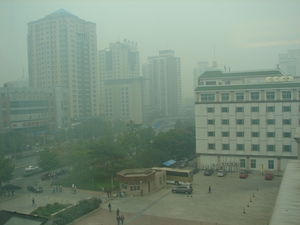For thousands of years, the profound teachings of Confucianism (儒家 Rujia) have imparted tremendous wisdom upon societies in China, throughout East Asia, and even the Far West. The famous sayings of ancient sages have transcended both historical and cultural barriers as they continue to be referenced and revered to this day.
 However, studying Confucian thought in parallel with relatively modern issues such as environmental degradation and climate change may seem strange upon first thought. Mitigating air pollution, improving water quality, and reducing Greenhouse Gases emissions, for example, are not explicitly expounded upon in the Confucian literature. But Confucianism has always been focused on social and political issues. Furthermore, the veil of smog looming over the skies of many Chinese cities today serves as a stern reminder of the serious environmental problems that have emerged from the very birthplace of Confucian wisdom.
However, studying Confucian thought in parallel with relatively modern issues such as environmental degradation and climate change may seem strange upon first thought. Mitigating air pollution, improving water quality, and reducing Greenhouse Gases emissions, for example, are not explicitly expounded upon in the Confucian literature. But Confucianism has always been focused on social and political issues. Furthermore, the veil of smog looming over the skies of many Chinese cities today serves as a stern reminder of the serious environmental problems that have emerged from the very birthplace of Confucian wisdom.
Why is this the case? Have we lost sight of the Confucian way? As China began to experiment with modernity, Confucian thought was condemned along with many other Chinese traditions. Confucianism, and often the figure of Confucius himself, was blamed by Nationalists as the source of weakness under Western imperialism. As for the communists, every remnant of Confucian tradition that was considered "feudal" was to be uprooted from society.1 These Confucian "roots", however, ran very deep and were able to survive over time. In China today, Confucianism is experiencing a revival and is being reshaped (for better or for worse) into a modern mold. To learn more about this phenomenon, please visit this website created by Li Xinyang.
 Furthermore, Confucianism can be interpreted in yet another way, one which perhaps follows its traditions more closely. By revisiting Confucian texts from an environmental perspective, the very teachings that guided the courts of Imperial China have the potential to enlighten modern society as environmental problems grow in severity. A Confucian scholar would find the source of these problems in the misconception of relations among Heaven, Earth, and humanity.2 The solution, therefore, is understanding these relationships and uniting Heaven and humanity (天人合一).
Furthermore, Confucianism can be interpreted in yet another way, one which perhaps follows its traditions more closely. By revisiting Confucian texts from an environmental perspective, the very teachings that guided the courts of Imperial China have the potential to enlighten modern society as environmental problems grow in severity. A Confucian scholar would find the source of these problems in the misconception of relations among Heaven, Earth, and humanity.2 The solution, therefore, is understanding these relationships and uniting Heaven and humanity (天人合一).
Like much of the emerging scholarship studying the relationship between environmentalism and traditional Chinese religion, philosophy, and culture, this website seeks to present this nuanced interpretation of Confucian thought to a broader audience. Thank you for visiting!
Endnotes
[1] Bell, Daniel A., and Hahm Chaibong. Confucianism for the Modern World. Cambridge: Cambridge University Press, 2003. 2.
[2] Li, Tianchen. “Confucian Ethics and the Environment.” Culture Mandala: The Bulletin of the Centre for East-West Cultural
and Economic Studies: Vol. 6: Iss. 1, Article 4. 2003. 1. <http://epublications.bond.edu.au/cm/vol6/iss1/4>.


